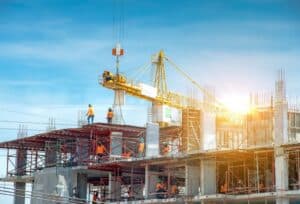How long does it take to do a Structural Survey?
 If you want to purchase a new property, having a survey carried out is always recommended. However, the type of survey that you decide to go for may vary depending on the property that you’re planning to buy and any plans that you have for it in the future. For the most part, the majority of properties will be a good candidate for a simple homebuyer’s report, but in some cases, you may want to consider having a structural survey carried out to ensure that you are going into the process of purchasing the property with as much information about it as possible. A structural survey is the most in-depth and comprehensive building survey that is available to buyers, and investing in this type of survey could help you save a significant amount of money on future work and repairs.
If you want to purchase a new property, having a survey carried out is always recommended. However, the type of survey that you decide to go for may vary depending on the property that you’re planning to buy and any plans that you have for it in the future. For the most part, the majority of properties will be a good candidate for a simple homebuyer’s report, but in some cases, you may want to consider having a structural survey carried out to ensure that you are going into the process of purchasing the property with as much information about it as possible. A structural survey is the most in-depth and comprehensive building survey that is available to buyers, and investing in this type of survey could help you save a significant amount of money on future work and repairs.
What is a Structural Survey?
The structural survey is the most comprehensive type of building survey offered by RICS surveyors. It will be carried out by a registered chartered surveyor who will conduct a detailed survey of all property areas, finding out anything that is important to know about the property. The surveyor will inspect all aspects of the building including the condition of the walls, ceilings, and the roof. They will also inspect the foundation of the property and check the type of materials that have been used in construction. During the survey, the surveyor will also actively check for any issues that may be present in the property such as the presence of dry rot, wet rot, mould, damp and more. Since this survey is the most in-depth option available, it can often be the most cost-effective choice despite being the most expensive. This is because it will uncover information that may be missed in the other surveys, allowing you to make the best decision regarding purchasing the home and making it easier to start repairing issues straight away before they worsen.
Do You Need a Structural Survey?
 Since the structural survey is the most expensive, invasive and extensive type of survey available, it’s always worth being sure if this is actually what you want to invest in for the home that you are planning to buy. Most of the time, an average home under thirty years old that is in reasonable condition will not need a structural survey, and a cheaper homebuyer’s report is likely to be the best option for finding out everything you need to know before making the purchase. Even newer buildings may only require a cheaper survey known as a condition report, which is a basic, shorter survey type that rates different areas of the building using a traffic light system. If you are considering purchasing a property and are not sure about the best type of survey to get, a RICS chartered surveyor can offer advice to help you make the right decision.
Since the structural survey is the most expensive, invasive and extensive type of survey available, it’s always worth being sure if this is actually what you want to invest in for the home that you are planning to buy. Most of the time, an average home under thirty years old that is in reasonable condition will not need a structural survey, and a cheaper homebuyer’s report is likely to be the best option for finding out everything you need to know before making the purchase. Even newer buildings may only require a cheaper survey known as a condition report, which is a basic, shorter survey type that rates different areas of the building using a traffic light system. If you are considering purchasing a property and are not sure about the best type of survey to get, a RICS chartered surveyor can offer advice to help you make the right decision.
What are the Benefits of a Structural Survey?
When it comes to the scope of issues that are looked out for, the other survey types tend to be more basic, and will not cover everything. One of the main benefits of having a structural survey carried out is that it is more likely to tell you everything that you need to know about the property before you buy it, including uncovering hidden issues that may not have come up during a homebuyer’s report.
Which Properties Should Have a Structural Survey?
 Not every property will need to have a structural survey carried out. As mentioned earlier, newer properties in good condition will likely only require a homebuyer’s report or condition report. However, if you are purchasing an older property that has a higher risk of defects, a structural survey will usually be recommended by experts. A structural survey may also be the best option for you if you are planning to purchase a property that is constructed unusually or has obvious defects and will need a lot of renovation. Even if your property does not require renovating, if you are planning to make substantial changes to it after making the purchase, it’s worth having a structural survey carried out so that you can conduct the work as safely as possible.
Not every property will need to have a structural survey carried out. As mentioned earlier, newer properties in good condition will likely only require a homebuyer’s report or condition report. However, if you are purchasing an older property that has a higher risk of defects, a structural survey will usually be recommended by experts. A structural survey may also be the best option for you if you are planning to purchase a property that is constructed unusually or has obvious defects and will need a lot of renovation. Even if your property does not require renovating, if you are planning to make substantial changes to it after making the purchase, it’s worth having a structural survey carried out so that you can conduct the work as safely as possible.
How Long to Expect for a Structural Survey
Since a structural survey is the most comprehensive type of survey with every area of the property inspected including behind the furniture, underneath the floorboards and in the attic or loft area, it is often the type of survey that will take the longest. Most of the time, the surveyor will need at least a few hours to a full day to carry out the inspections. The length of time that you can expect the survey to take will also vary based on several other factors, including the size of the home, as larger homes will take longer to survey compared to smaller properties. In addition, the condition of the home can also impact the survey length since more defects and problems are likely to take the surveyor more time to inspect and report on. If you’re having a structural survey carried out, you can ask the current homeowner to help speed up the process by making sure that the surveyor can easily access all areas of the home, including moving any bulky furniture to make inspections faster.
When you can expect to get the survey report back after the structural survey has been carried out will depend on several factors. The complexity of the report will be based on the findings of the survey, so the more issues there are to report on, the longer the survey will take. Most of the time, you can expect to wait no longer than ten days for a structural survey report to come back. Your surveyor will inform you if the report is likely to take longer.
Since a structural survey involves inspecting every area of the property, it’s usually the type of survey to take the longest. Expect to provide the surveyor with access to the property for most of the day.
